语言学——功能语法简介
韩礼德功能语法

三、层次的思想 1.语言是有层次的,至少包括语义层、词汇 语法层、音系层。 2.各个层次间存在“体现”的关系。即对 “意义”的选择(语义层)体现于对“形式” (词汇语法层)的选择;对“形式”的选择又 体现于对“实体”(音系层)的选择。 3.根据体现的观点,我们又可把语言看作一 个多重代码系统,即由一个系统代入另一个系 统,而后又带入另一个系统。
《语言功能探索》 (1973) 《语言的系统和功能》(1976) 《作为社会符号的语言》 (1978) 《学习做到有所指》 《功能语法导论》本书出版于 1985年,英文名《An Introduction to Functional Grammar》,是韩礼德功能语 言学理论的重要著作。 《婴幼儿的语言》 《韩礼德语言学文集》
韩礼德的系统语法与其他语言学家的理论有所 不同,主要体现在以下几个方面: 第一,系统语法十分重视语言的社会学特征; 第二,系统语法认为语言是“做事”的一种手段, 而不是“知识”的手段。它区分了“语言行为潜 势”和“实际语言行为”; 第三,系统语法比较重视对个别语言以及个别变 体的描写; 第四,系统语法用“连续体”这一概念来解释众 多语言事实(例如:不符合语法的--反常--不太 反常--不太惯常--符合语法); 第五,系统语法依靠对语篇的观察和数据来验证 自己的假设;第六,系统语法以"系统"为基本范 畴。
Байду номын сангаас
在系统网络中,出现在箭头左侧的是入列条件。第一, 为了对事物进行更为严格的区分,系统中的选择必须有 共同的意义场。例如,否定选择和复数选择是不同的, 但是它们之间的不同远不如否定和肯定、单数和复数之 间的区别那么明显。第二,选择必须有共同的语法环境。 第三,选择必须描写适合系统的正确单位(也就是说, 必须说明该单位是小句还是短语)。第四,系统常常互 相提供入列条件。在许多情况下,要从一个系统中作出 选择,只有已经从其他系统中作出其他选择之后才有可 能实现。例如,在选择语气系统以前,我们必须首先去 选择有限或是无限。
第四章-系统功能语言学-功能语法
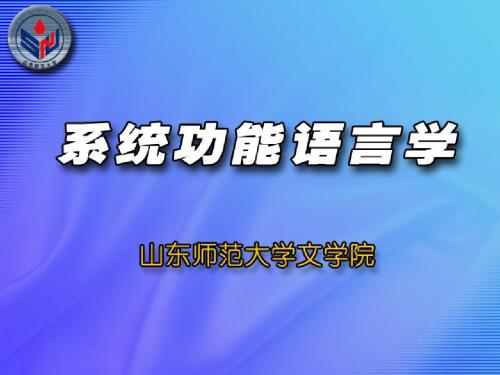
1、物质过程:表示做某件事的过程(a process of doing)。 该过程一般由动态动词表示,包括“动作者” (actor)和动作的“目标”(goal)。如: 他推走了车。(主动语态) 车被他推走了。 (非主动语态)
他把车推走了。 (非主动语态)
物质过程中的“动作者”或“目标”可能出现,也可能
讨论题
1、阅读教材P106-113,结合功能理论理解
“汉语的概念功能”。
2、如何理解功能语法中的“概念”?
(1)“归属”类:指某个实体具有哪些 属性,或者归于哪种类型。其公式是“a是x 的一种”。 归属类之内包式指某个实体是某类实体中
的一分子。如:
艾青是一位诗人。
归属类之环境式指某个实体与环境因素(如时
间、地点等)之间的关系。如:
The cat is on the mat.(注意与汉语的区别)
The film lasted three hours.
识别类之环境式指两个实体在时间、地点、状
态等环境意义上相互联系。如:
This is the place where I met him.
The best way to get there is by train.
识别类之所有式指某个实体出现,是为了识别
它相关的占有者和被占有物。如:
钢琴是彼德的。/ The piano is Peter’s.(这与 归属类所有式在形式上趋于一致,但强调重点不同)
他打碎了碗。/碗被他打碎了。/碗被打碎了。 /碗打碎了。
他切完了菜。/菜被他切完了。/菜被切完了。 /菜切完了。
三、逻辑功能的类型
• 逻辑功能是语言所具备的反映两个或两个
以上语言单位之间逻辑语义关系的功能。
系统功能语法概述halliday
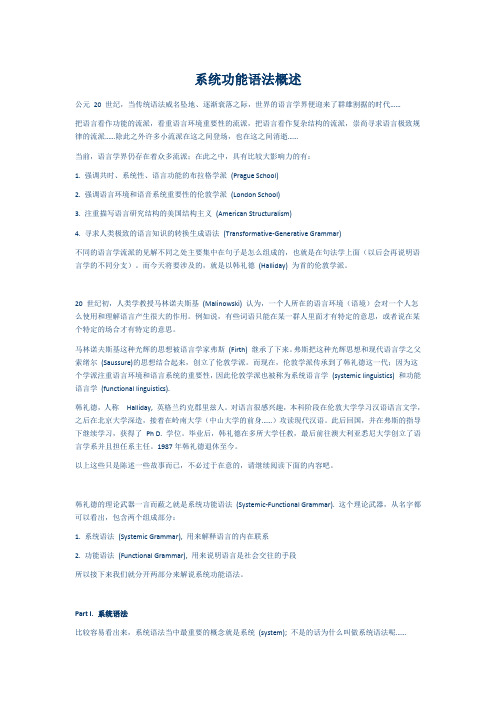
系统功能语法概述公元20 世纪,当传统语法威名坠地、逐渐衰落之际,世界的语言学界便迎来了群雄割据的时代……把语言看作功能的流派,看重语言环境重要性的流派,把语言看作复杂结构的流派,崇尚寻求语言极致规律的流派……除此之外许多小流派在这之间登场,也在这之间消逝……当前,语言学界仍存在着众多流派;在此之中,具有比较大影响力的有:1. 强调共时、系统性、语言功能的布拉格学派(Prague School)2. 强调语言环境和语音系统重要性的伦敦学派(London School)3. 注重描写语言研究结构的美国结构主义(American Structuralism)4. 寻求人类极致的语言知识的转换生成语法(Transformative-Generative Grammar)不同的语言学流派的见解不同之处主要集中在句子是怎么组成的,也就是在句法学上面(以后会再说明语言学的不同分支)。
而今天将要涉及的,就是以韩礼德(Halliday) 为首的伦敦学派。
20 世纪初,人类学教授马林诺夫斯基(Malinowski) 认为,一个人所在的语言环境(语境)会对一个人怎么使用和理解语言产生很大的作用。
例如说,有些词语只能在某一群人里面才有特定的意思,或者说在某个特定的场合才有特定的意思。
马林诺夫斯基这种光辉的思想被语言学家弗斯(Firth) 继承了下来。
弗斯把这种光辉思想和现代语言学之父索绪尔(Saussure)的思想结合起来,创立了伦敦学派。
而现在,伦敦学派传承到了韩礼德这一代;因为这个学派注重语言环境和语言系统的重要性,因此伦敦学派也被称为系统语言学(systemic linguistics) 和功能语言学(functional linguistics).韩礼德,人称Halliday, 英格兰约克郡里兹人。
对语言很感兴趣,本科阶段在伦敦大学学习汉语语言文学,之后在北京大学深造,接着在岭南大学(中山大学的前身……)攻读现代汉语。
系统功能语法
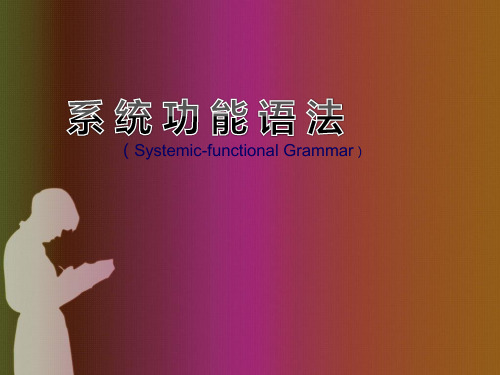
物性系统可以分为 6 个过程 (Processes), 分别是: 物质过程 (material process), 心理过程 (mental process), 关系过程 (relational process), 行为过程 (behavioral process), 言语过程 (verbal process), 存在过程 (existential process).
组成部分: 概念功能 (ideational function)、 人际功能 (interpersonal functions)、
语篇功能 (textual function).
I. 概念功能
概念功能由两个子功能组成,分别是经 验功能 (Experiential Function) 和逻辑功 能 (Logical Function). 概念功能就是用来向听话人传递新信息 的。 概念功能的两个部分当中,经验功能主 要由及物性系统 (Transitivity System) 和 语态 (Voice) 构成
1. 给予物品和服务,也就是提供 (offer). 对 于提供,对方可以有接受 (acceptance) 和退 回 (rejection) 两种回应。 2. 求取物品和服务,也就是命令 (command). 对于命令,对方可以有执行 (undertaking) 和拒绝 (refusal) 两种回应。 3. 给予信息,也就是陈述 (statement). 对于 陈述,对方可以有认可 (acknowledgement) 和驳回 (contradiction) 两种回应。 4. 求取信息,也就是提问 (question). 对于提 问,对方可以有回答 (answer) 和拒答 (disclaimer) 两种回应。
(Systemic-functional Grammar)
系统功能语法概述Halliday
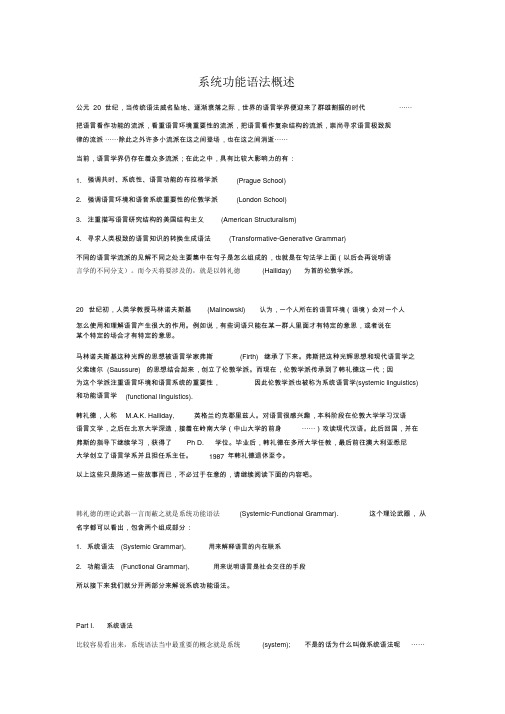
系统功能语法概述公元 20 世纪,当传统语法威名坠地、逐渐衰落之际,世界的语言学界便迎来了群雄割据的时代⋯⋯把语言看作功能的流派,看重语言环境重要性的流派,把语言看作复杂结构的流派,崇尚寻求语言极致规律的流派⋯⋯除此之外许多小流派在这之间登场,也在这之间消逝⋯⋯当前,语言学界仍存在着众多流派;在此之中,具有比较大影响力的有:1.强调共时、系统性、语言功能的布拉格学派(Prague School)2.强调语言环境和语音系统重要性的伦敦学派(London School)3.注重描写语言研究结构的美国结构主义(American Structuralism)4.寻求人类极致的语言知识的转换生成语法(Transformative-Generative Grammar)不同的语言学流派的见解不同之处主要集中在句子是怎么组成的,也就是在句法学上面(以后会再说明语言学的不同分支)。
而今天将要涉及的,就是以韩礼德(Halliday)为首的伦敦学派。
20世纪初,人类学教授马林诺夫斯基(Malinowski)认为,一个人所在的语言环境(语境)会对一个人怎么使用和理解语言产生很大的作用。
例如说,有些词语只能在某一群人里面才有特定的意思,或者说在某个特定的场合才有特定的意思。
马林诺夫斯基这种光辉的思想被语言学家弗斯(Firth) 继承了下来。
弗斯把这种光辉思想和现代语言学之父索绪尔 (Saussure) 的思想结合起来,创立了伦敦学派。
而现在,伦敦学派传承到了韩礼德这一代;因为这个学派注重语言环境和语言系统的重要性,因此伦敦学派也被称为系统语言学(systemic linguistics)和功能语言学(functional linguistics).韩礼德,人称M.A.K. Halliday,英格兰约克郡里兹人。
对语言很感兴趣,本科阶段在伦敦大学学习汉语语言文学,之后在北京大学深造,接着在岭南大学(中山大学的前身⋯⋯)攻读现代汉语。
系统功能语法概述-Halliday

系统功能语法概述-Halliday系统功能语法概述公元20 世纪,当传统语法威名坠地、逐渐衰落之际,世界的语言学界便迎来了群雄割据的时代……把语言看作功能的流派,看重语言环境重要性的流派,把语言看作复杂结构的流派,崇尚寻求语言极致规律的流派……除此之外许多小流派在这之间登场,也在这之间消逝……当前,语言学界仍存在着众多流派;在此之中,具有比较大影响力的有:1. 强调共时、系统性、语言功能的布拉格学派(Prague School)2. 强调语言环境和语音系统重要性的伦敦学派(London School)3. 注重描写语言研究结构的美国结构主义(American Structuralism)4. 寻求人类极致的语言知识的转换生成语法(Transformative-Generative Grammar)不同的语言学流派的见解不同之处主要集中在句子是怎么组成的,也就是在句法学上面(以后会再说明语言学的不同分支)。
而今天将要涉及的,就是以韩礼德(Halliday) 为首的伦敦学派。
20 世纪初,人类学教授马林诺夫斯基(Malinowski) 认为,一个人所在的语言环境(语境)会对一个人怎么使用和理解语言产生很大的作用。
例如说,有些词语只能在某一群人里面才有特定的意思,或者说在某个特定的场合才有特定的意思。
马林诺夫斯基这种光辉的思想被语言学家弗斯(Firth) 继承了下来。
弗斯把这种光辉思想和现代语言学之父索绪尔(Saussure)的思想结合起来,创立了伦敦学派。
而现在,伦敦学派传承到了韩礼德这一代;因为这个学派注重语言环境和语言系统的重要性,因此伦敦学派也被称为系统语言学(systemic linguistics) 和功能语言学(functional linguistics).韩礼德,人称M.A.K. Halliday, 英格兰约克郡里兹人。
对语言很感兴趣,本科阶段在伦敦大学学习汉语语言文学,之后在北京大学深造,接着在岭南大学(中山大学的前身……)攻读现代汉语。
韩礼德三大纯理功能课件

语篇翻译
系统功能语法可以指导机 器在翻译过程中保持原文 的语篇结构和逻辑关系, 提高翻译质量。
文化翻译
系统功能语法可以帮助机 器理解文化背景和语言习 惯,提高翻译的准确性和 可读性。
THANKS
感谢观看
韩礼德三大纯理功能课件
• 系统功能语法简介 • 概念纯理功能 • 交际纯理功能 • 语篇纯理功能 • 系统功能语法应用
01
系统功能语法简介
系统功能语法的定义
系统功能语法是一种语言学理论,由英国语言学家韩礼德提出,旨在探究语言在社 会语境中的功能。
它强调语言是一个系统网络,由多个系统组成,每个系统都为语言的各种功能服务 。
系统功能语法与其它语法理论的关系
系统功能语法与传统的语法理论有所 不同,它更注重语言的功能和语境, 而非仅仅关注语言的形态和结构。
系统功能语法在发展过程中也吸收和 借鉴了其它语言学理论的观点和方法 ,形成了自己独特的理论体系。
它与生成语法等其它语言学理论也存 在一定的联系和共同点,如对语言结 构的探究。
人际关系处理
人际关系处理是指通过语言表 达建立和维护人与人之间的联 系,包括表达情感、意愿、需 求等,以及处理人际关系中的
冲突和问题。
人际关系处理的语言表达方式 包括问候、感谢、道歉、请求 等,通过这些方式能够建立和
维护良好的人际关系。
在人际关系处理中,语言的情 感表达非常重要,需要使用适 当的语气和表情,以传递真实 的情感和意愿。
在事物处理过程中,语言的准确性和 专业性非常重要,需要使用专业术语 和严谨的表达方式,以确保信息的准 确性和可靠性。
事物处理的语言表达方式包括定义、 分类、比较、对比等,通过这些方式 能够使听者更好地理解事物的本质属 性和特征。
系统功能语法概述 Halliday
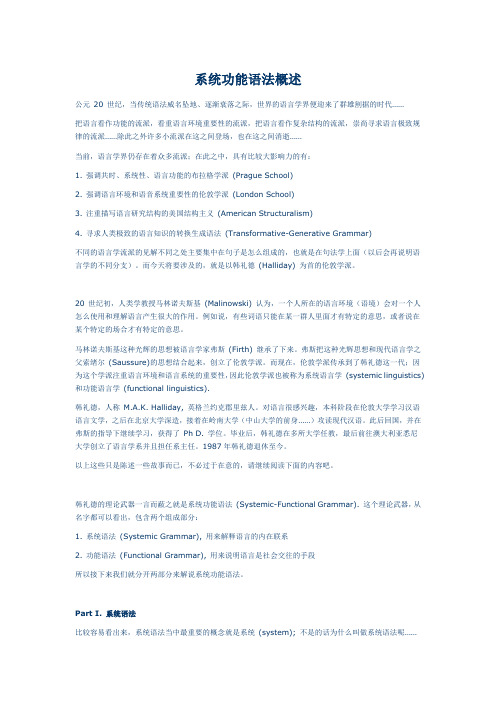
系统功能语法概述公元20 世纪,当传统语法威名坠地、逐渐衰落之际,世界的语言学界便迎来了群雄割据的时代……把语言看作功能的流派,看重语言环境重要性的流派,把语言看作复杂结构的流派,崇尚寻求语言极致规律的流派……除此之外许多小流派在这之间登场,也在这之间消逝……当前,语言学界仍存在着众多流派;在此之中,具有比较大影响力的有:1. 强调共时、系统性、语言功能的布拉格学派(Prague School)2. 强调语言环境和语音系统重要性的伦敦学派(London School)3. 注重描写语言研究结构的美国结构主义(American Structuralism)4. 寻求人类极致的语言知识的转换生成语法(Transformative-Generative Grammar)不同的语言学流派的见解不同之处主要集中在句子是怎么组成的,也就是在句法学上面(以后会再说明语言学的不同分支)。
而今天将要涉及的,就是以韩礼德(Halliday) 为首的伦敦学派。
20 世纪初,人类学教授马林诺夫斯基(Malinowski) 认为,一个人所在的语言环境(语境)会对一个人怎么使用和理解语言产生很大的作用。
例如说,有些词语只能在某一群人里面才有特定的意思,或者说在某个特定的场合才有特定的意思。
马林诺夫斯基这种光辉的思想被语言学家弗斯(Firth) 继承了下来。
弗斯把这种光辉思想和现代语言学之父索绪尔(Saussure)的思想结合起来,创立了伦敦学派。
而现在,伦敦学派传承到了韩礼德这一代;因为这个学派注重语言环境和语言系统的重要性,因此伦敦学派也被称为系统语言学(systemic linguistics) 和功能语言学(functional linguistics).韩礼德,人称M.A.K. Halliday, 英格兰约克郡里兹人。
对语言很感兴趣,本科阶段在伦敦大学学习汉语语言文学,之后在北京大学深造,接着在岭南大学(中山大学的前身……)攻读现代汉语。
语言学知识复习总结
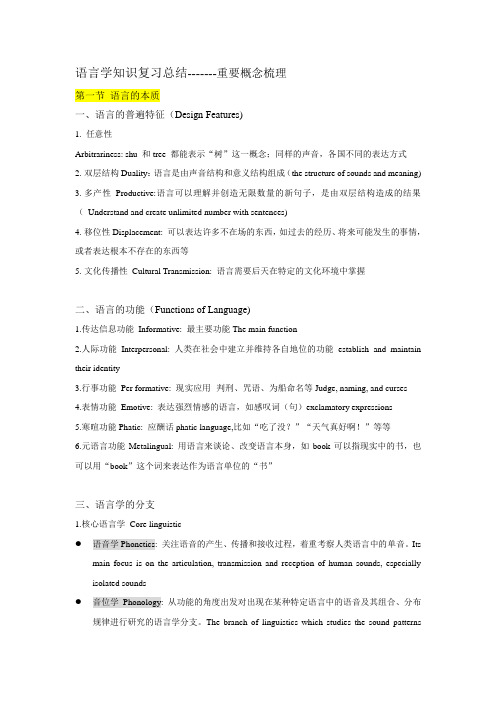
语言学知识复习总结-------重要概念梳理第一节语言的本质一、语言的普遍特征(Design Features)1. 任意性Arbitrariness: shu 和tree 都能表示“树”这一概念;同样的声音,各国不同的表达方式2.双层结构Duality:语言是由声音结构和意义结构组成(the structure of sounds and meaning)3.多产性Productive:语言可以理解并创造无限数量的新句子,是由双层结构造成的结果(Understand and create unlimited number with sentences)4.移位性Displacement: 可以表达许多不在场的东西,如过去的经历、将来可能发生的事情,或者表达根本不存在的东西等5.文化传播性Cultural Transmission: 语言需要后天在特定的文化环境中掌握二、语言的功能(Functions of Language)1.传达信息功能Informative: 最主要功能The main function2.人际功能Interpersonal: 人类在社会中建立并维持各自地位的功能establish and maintain their identity3.行事功能Per formative: 现实应用--判刑、咒语、为船命名等Judge, naming, and curses4.表情功能Emotive: 表达强烈情感的语言,如感叹词(句)exclamatory expressions5.寒暄功能Phatic: 应酬话phatic language,比如“吃了没?”“天气真好啊!”等等6.元语言功能Metalingual: 用语言来谈论、改变语言本身,如book可以指现实中的书,也可以用“book”这个词来表达作为语言单位的“书”三、语言学的分支1.核心语言学Core linguistic●语音学Phonetics: 关注语音的产生、传播和接收过程,着重考察人类语言中的单音。
语言学概论(第四版)语法

三、形态和形态分类
1. 形态的定义: • 狭义的形态指的是构形法,也叫构形形态,即用一个词的词形变化表示不同的语法 意义。如前面提到的内部屈折法、异根法等方法,其特点是不改变词汇意义。 • 广义形态不但指构形法(构形形态),而且兼指狭义构词法(也叫构词形态),即 在词根的基础上按照一定的规则创造新词的方法。其特点是产生新词,大多改变词 汇意义。
三、句法结构的分析方法
(一)句子成分分析法 1. 含义:从句法结构的关系意义特别是显性意义入手,对句子成分的功能和地位做分析 2. 优缺点
• 优点:句中各个词之间的关系主次分明,各个词的作用和功能比较清楚,有利于修 正病句。句子成分分析法在学校语法教学中仍具有一定影响。
• 缺点:从词出发,以词定成分,这在很多情况下行不通。有时,在句中作为一个成 分起作用的不是单个的词,而是短语。忽视这一点,对于有些句子往往无法进行分 析,或者强行机械分析而得出好笑的结果。
三、句法结构的分析方法
(二)直接成分分析法 1. 含义:指从句法结构的外部形式,特别是隐性形式入手,对句子的直接组成成分进行分
析的方法。由于句子的直接成分与句子的层次性一致,所以也叫层次分析法。又由于通 常的直接成分分析法是对句子结构的各个部分不断地一分为二,所以又叫二分法(但有 时可以一分为三)。
(一)词形范畴 指用词形变化表现出来的语法意义的概括种类。一般包括性、数、格、体、时、态、式、人 称、级等。 1. 性:即名词、形容词用词尾标志或词形变化表现的语法上的性别观念种类。 2. 数:指运用词形变化表明某类词的数目的语法意义的一个种类。 3. 格:即从名词、代词、形容词在句中与其他词的关系中,以词形变化的形式概括出来的
二、篇章的连贯性
1. 连贯性指篇章的语义关联,它存在于篇章的底层,是一种语义逻辑的联系。 2. 分析篇章的连贯性可以研究篇章中所表达的各种概念或论点之间的关系。 3. 篇章中的概念和论点可以分为两大类:一类是基本概念,中心论点;另一类是次要概念,
系统功能语法

• 另一种是修辞和民族学思路,把语言看作 一种创建意义的资源。 • 这种思路突出把语篇(话语)看作语言的 基本单位,根据语境组织而成,因此研究 的是处于语境中的句子。
• 语言使用产生的意义分为三个成分:概念 意义、人际意义、语篇意义。 • 采用动作者(actor)、施事(agent)、中 介(medium)、主位、语气等来分析语句。
语域和语类
• 社会语境包括两个交际层:语类(文化语境)和语域(情 景语境)。 • 在Martin看来,语类是阶段性的、目标导向的社会过程。 • 语类包括日常社会生活中的所有活动,如购物、发短信、 看病、餐馆用餐、新闻访谈、运动会开幕式等。 • 书面语类包括叙事、报告、解释、程序、说明等。 • 语类具有特有的结构,出现在特定的语境。 • 情景语境是社会语境的另一个方面,包括语场(field)、 语旨(tenor)和语式(mode)。
• 人际意义在词汇语法上通过语气和情态系统以及评价性词 汇所体现。 • 在Halliday(1994)看来,情态涉及对命题或提议介于是 否两极的意义协商。这种协商涉及或然率(probability)、 经常性(usuality)、义务(olbigation)或倾向性 (inclination)。
• 语篇意义由主位系统和信息结构所体现。 • 需要注意的是,这些意义是同时出现的,而且是 互补的。
• 词汇语法是表达意义的资源,能把意义体现为具体的词汇 和语法项。因此,词汇语法在小句中同时表达三种不同的 功能意义:概念意义、人际意义和语篇意义。 • 概念意义包括经验意义和逻辑意义。 • 经验意义在词汇语法上通过及物性(transitivity)体现。 及物性系统包括参加者、过程和环境成分,识解了我们对 现实世界和内心世界的经验。 • 逻辑意义通过把小句链接成小句复合体(clause complex) 的语言手段体现。
第六章-系统功能语言学-功能语法-语篇功能

• 信息中心,也就是新信息的“最高点”,标志着所 在信息单位的新信息至此结束。如: //It /needs to have /love.//
• 其中,//是信息音位分界线,/是音步,下划线为重 音突出,即新信息最高点。
• 信息中心所传递的信息,比其他部分所传递的信息 更加突出、更加重要。它是最重要的信息。
连接:通过连接成分体现语篇中各种逻辑关系的 手段。连接成分往往是一些过渡性词语,表示时间、 因果、条件等逻辑关系。如:
如果浮尘太大,那么飞机就无法起飞。 有时并不用明显的连接成分,称作零形式连接或 意合连接。如: He died three days ago. He was buried in London.(时间关系) She didn’t know the rules. She died.(因果)
T3
• China is in Asia. Japan is in Asia. And India is in Asia, too.
• 张三喜欢运动。李四喜欢运动。王五也喜欢运动。
• 第三种是阶梯型,即后一个句子的主位是前一句子 的述位。汉语中的顶针与此相当。图示为:
T1
R1
• 如:
T2
R2
(1)Mary bought a carpet. It was made in Turkey. Turkey is a country in Asia.
1、信息结构的基本含义
• 信息结构是把语言组织成为“信息单位” (information unit)的结构。
• 信息单位是信息交流的基本成分。信息交流 是言语活动过程中,已知信息与新信息之间 的相互作用。
• 已知信息是言语活动中已经出现过的或根据 语境可以断定的成分;新信息是言语活动中 尚未出现或根据语境难以断定的成分。
功能语言学简介..
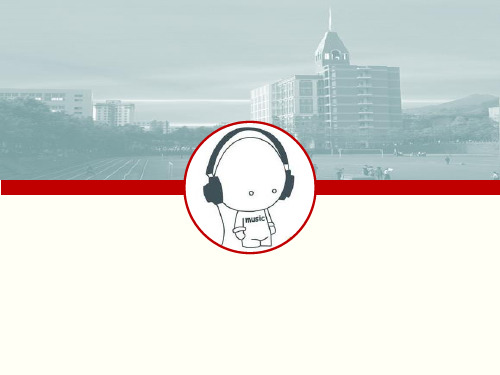
语法功能是最具体的一种功能,它是纯理功能在语 言系统中的体现形式。
五种功能的关系
纯理功能产生于宏观功能,宏观 功能产生于微观功能,语法功能是纯 理功能在 词汇和语法层中的具体体现, 人们平时对语言的实际运用,构成了 一般意义上的语言功能。
系统功能语言学与语篇分析
功能语言学之所以不同于形式主义语言学的一个重 要方面在于前者视语篇为语言研究的基本单位和出发点, 而后者将语言研究的单位局限于句子的范围之内。系统 功能语言学在研究句法结构时突破了句本位思想,重视 对语篇的研究。Halliday(1994)明确地将系统功能 语法称为“语篇语法”(discourse grammar)。认 为语篇指的是任何长度的,在语义上完整的口头或书面 的语段。
法国学派
Martinet Kristeva
三个独创之处:语言的双重分节;语言的经济 原则;语言的现实主义原则。
Martinet认为尽管语言可以发挥表达、交际和 审美等多种功能,但交际功能才是语言的“中 心功能”,在语言研究的各个方面都应该贯穿 功能主义。
她 于 1967 年 首 先 创 造 “ 互 文 性 ” (intertextuality)这个术语,并把它引入文本 分析和文学批评。所谓“互文”(intertext) 指的是存在于其他语篇之间的语篇;所谓“互 文性”指的就是不同语篇之间的这种相互关系。
Halliday的功能思想
3.宏观功能 macrofunction
宏观功能是儿童放弃原型语言向成人语言过渡时出 现的语言功能。韩礼德认为宏观功能可以分为两种:一 种是理性功能(mathetic function),另一种是实用功 能(pragmatic function)。
4.纯理功能
系统功能语法概述
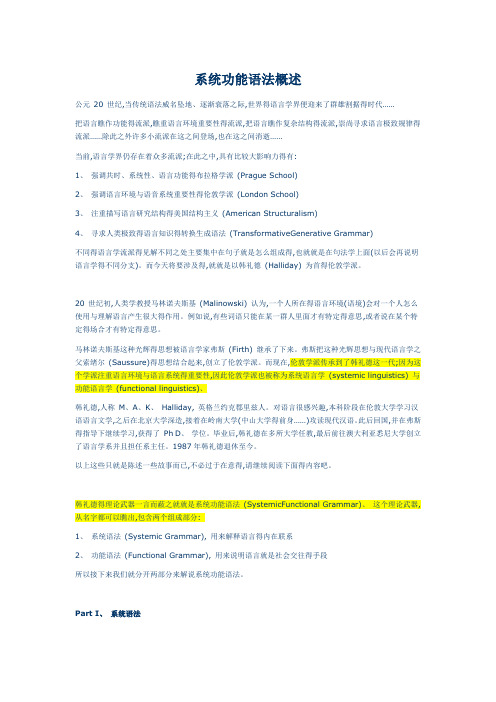
系统功能语法概述公元20 世纪,当传统语法威名坠地、逐渐衰落之际,世界得语言学界便迎来了群雄割据得时代……把语言瞧作功能得流派,瞧重语言环境重要性得流派,把语言瞧作复杂结构得流派,崇尚寻求语言极致规律得流派……除此之外许多小流派在这之间登场,也在这之间消逝……当前,语言学界仍存在着众多流派;在此之中,具有比较大影响力得有:1、强调共时、系统性、语言功能得布拉格学派(Prague School)2、强调语言环境与语音系统重要性得伦敦学派(London School)3、注重描写语言研究结构得美国结构主义(American Structuralism)4、寻求人类极致得语言知识得转换生成语法(TransformativeGenerative Grammar)不同得语言学流派得见解不同之处主要集中在句子就是怎么组成得,也就就是在句法学上面(以后会再说明语言学得不同分支)。
而今天将要涉及得,就就是以韩礼德(Halliday) 为首得伦敦学派。
20 世纪初,人类学教授马林诺夫斯基(Malinowski) 认为,一个人所在得语言环境(语境)会对一个人怎么使用与理解语言产生很大得作用。
例如说,有些词语只能在某一群人里面才有特定得意思,或者说在某个特定得场合才有特定得意思。
马林诺夫斯基这种光辉得思想被语言学家弗斯(Firth) 继承了下来。
弗斯把这种光辉思想与现代语言学之父索绪尔(Saussure)得思想结合起来,创立了伦敦学派。
而现在,伦敦学派传承到了韩礼德这一代;因为这个学派注重语言环境与语言系统得重要性,因此伦敦学派也被称为系统语言学(systemic linguistics) 与功能语言学(functional linguistics)、韩礼德,人称M、A、K、Halliday, 英格兰约克郡里兹人。
对语言很感兴趣,本科阶段在伦敦大学学习汉语语言文学,之后在北京大学深造,接着在岭南大学(中山大学得前身……)攻读现代汉语。
第五章-系统功能语言学-功能语法-人际功能

要借助语言来交换。
(二)言语功能 交际角色和交流物这两个变项组成了四种
最主要的言语功能:提供、命令、陈述、提
问。如下表:
给予或求取物品和服务或信息
交流角色 交换物
(a)物品与服务
给予 求取 提供 命令
(b)信息
陈述 提问
交流中的步(move)的言语功能系统
起始 步 作答 给予 M 起始角色 命令 N 开放 A 要求有反应 B 可预测 任意的 MX:提供 NX:命令 提议 命题 C D
一情景语境中,来表达他的态度和推断,并 试图影响别人的态度和行为。
•人际功能还表示与情景有关的角色关系,包 括交际角色关系,即讲话者或听话者在交际
过程中扮演的角色之间的关系,如提问者与
回答者,告知者与怀疑者等之间的关系。
(一)言语角色与交流物 言语角色:在交际过程中,讲话者可能扮
演各种不同的角色,如陈述、提问、命令、
谓句相当。如:
How clever!
Get out!
Hi!
三、归一性与情态
可以对命题和提议做出判断或评价的有两个系
统:归一性和情态。
(一)归一性
归一性,即肯定和否定,规定和禁止,是在任
何语言的作为命题或者提议的小句中得到语法化的
范畴。一般而言,肯定无标记,而否定有标记(否 定词)。
有人统计,肯定句与否定句在语篇中的比例
求取信息
回答:A teapot.
言语功能在语法中的典型体现
起始:整句 AMX (I’ll …/Shall I…?) 作答:省略句 CMX (yes; do)
BMX
AMY BMY
(I’ll …, Shall I…?)
declar Declar + moodtag
系统功能语言学的理论特点
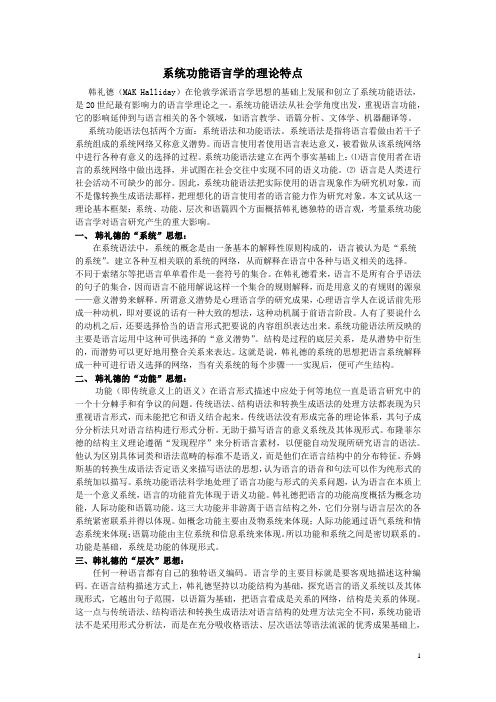
系统功能语言学的理论特点韩礼德(MAK Halliday)在伦敦学派语言学思想的基础上发展和创立了系统功能语法,是20世纪最有影响力的语言学理论之一。
系统功能语法从社会学角度出发,重视语言功能,它的影响延伸到与语言相关的各个领域,如语言教学、语篇分析、文体学、机器翻译等。
系统功能语法包括两个方面:系统语法和功能语法。
系统语法是指将语言看做由若干子系统组成的系统网络又称意义潜势。
而语言使用者使用语言表达意义,被看做从该系统网络中进行各种有意义的选择的过程。
系统功能语法建立在两个事实基础上:⑴语言使用者在语言的系统网络中做出选择,并试图在社会交往中实现不同的语义功能。
⑵语言是人类进行社会活动不可缺少的部分。
因此,系统功能语法把实际使用的语言现象作为研究机对象,而不是像转换生成语法那样,把理想化的语言使用者的语言能力作为研究对象。
本文试从这一理论基本框架:系统、功能、层次和语篇四个方面概括韩礼德独特的语言观,考量系统功能语言学对语言研究产生的重大影响。
一、韩礼德的“系统”思想:在系统语法中,系统的概念是由一条基本的解释性原则构成的,语言被认为是“系统的系统”。
建立各种互相关联的系统的网络,从而解释在语言中各种与语义相关的选择。
不同于索绪尔等把语言单单看作是一套符号的集合。
在韩礼德看来,语言不是所有合乎语法的句子的集合,因而语言不能用解说这样一个集合的规则解释,而是用意义的有规则的源泉——意义潜势来解释。
所谓意义潜势是心理语言学的研究成果,心理语言学人在说话前先形成一种动机,即对要说的话有一种大致的想法,这种动机属于前语言阶段。
人有了要说什么的动机之后,还要选择恰当的语言形式把要说的内容组织表达出来。
系统功能语法所反映的主要是语言运用中这种可供选择的“意义潜势”。
结构是过程的底层关系,是从潜势中衍生的,而潜势可以更好地用整合关系来表达。
这就是说,韩礼德的系统的思想把语言系统解释成一种可进行语义选择的网络,当有关系统的每个步骤一一实现后,便可产生结构。
韩礼德的功能语法和社会语言
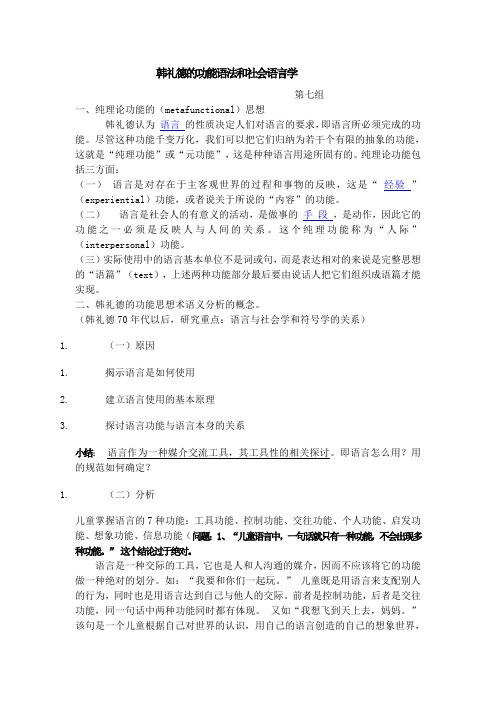
韩礼德的功能语法和社会语言学第七组一、纯理论功能的(metafunctional)思想韩礼德认为语言的性质决定人们对语言的要求,即语言所必须完成的功能。
尽管这种功能千变万化,我们可以把它们归纳为若干个有限的抽象的功能,这就是“纯理功能”或“元功能”,这是种种语言用途所固有的。
纯理论功能包括三方面:(一)语言是对存在于主客观世界的过程和事物的反映,这是“经验”(experiential)功能,或者说关于所说的“内容”的功能。
(二)语言是社会人的有意义的活动,是做事的手段,是动作,因此它的功能之一必须是反映人与人间的关系。
这个纯理功能称为“人际”(interpersonal)功能。
(三)实际使用中的语言基本单位不是词或句,而是表达相对的来说是完整思想的“语篇”(text),上述两种功能部分最后要由说话人把它们组织成语篇才能实现。
二、韩礼德的功能思想术语义分析的概念。
(韩礼德70年代以后,研究重点:语言与社会学和符号学的关系)1.(一)原因1.揭示语言是如何使用2.建立语言使用的基本原理3.探讨语言功能与语言本身的关系小结:语言作为一种媒介交流工具,其工具性的相关探讨。
即语言怎么用?用的规范如何确定?1.(二)分析儿童掌握语言的7种功能:工具功能、控制功能、交往功能、个人功能、启发功能、想象功能、信息功能(问题:1、“儿童语言中,一句话就只有一种功能,不会出现多种功能。
”这个结论过于绝对。
语言是一种交际的工具,它也是人和人沟通的媒介,因而不应该将它的功能做一种绝对的划分。
如:“我要和你们一起玩。
” 儿童既是用语言来支配别人的行为,同时也是用语言达到自己与他人的交际。
前者是控制功能,后者是交往功能,同一句话中两种功能同时都有体现。
又如“我想飞到天上去,妈妈。
”该句是一个儿童根据自己对世界的认识,用自己的语言创造的自己的想象世界,儿童口中的“天”不是我们成人世界观里正常的对于“天空”、“外太空”、“摆脱地球的吸引力”的界定,而是与周围环境毫无关联的不存在的空间。
- 1、下载文档前请自行甄别文档内容的完整性,平台不提供额外的编辑、内容补充、找答案等附加服务。
- 2、"仅部分预览"的文档,不可在线预览部分如存在完整性等问题,可反馈申请退款(可完整预览的文档不适用该条件!)。
- 3、如文档侵犯您的权益,请联系客服反馈,我们会尽快为您处理(人工客服工作时间:9:00-18:30)。
What do they mean? Why can we make meaning from them? Do they mean the same to everyone?
When I got home last night, I could not believe what ………….. had done.
cost of interest fees. A substantial education program is required to reverse
this trend.
3 main kinds of meaning simultaneously:
1.Experiential: information (field)
What’s the context of the text? What accompanies the language? What kind of a text is it? (genre) What are the stages of the text? What is it about? (field) Who is involved? (tenor) Mode of communication? (mode)
Tenor Tenor continuum
equal status….………great difference in status
familiar …….…………..………...….very distant
great deal of …………………………………little emotional expression
2.Interpersonal: relationships (tenor) 3.Textual: relation to mode (mode)
Field
Field continuum
everyday ………..specialised ………highly fields fields technical fields
expectation of a gift laden Christmas has
lead some families to incur debts beyond their means of immediate repayment,
leading to the additional and spiralling
Language Education: Christie; Macken and Rothery Visual art: O’Toole; Kress and van Leeuwen; Unsworth
Psychotherapy: Eggins; MacKinnon
Artificial Intelligence: Bateman Speech Pathology: Armstrong
KEY RESEARCHERS
Development of systemic linguistics:
Sydney systemists: Michael Halliday (from 1970s); Hasan; Martin; Matthiesson
Links with other systemists: Gregory; Sinclair and Coulthard
References:
Eggins (1994) An Introduction to Systemic Functional Linguistics, Pinter Love, Pigdon, Baker Built (Building Understandings in Literacy and Teaching) CDROM 2nd Edition, University of Melbourne
B: Here you are.
A: Thankyou. B: Thankyou.
Data reveals that the greatest consumer
spending traditionally occurs during the
pre Christmas period. A consequence of this spending is debt. The publicity and
mode
LANGUAGE REGISTER
GENRE
SEMIOTIC SYSTEM
(SYMBOLIC MEANING MAKING SYSTEM)
meaning (discourse / semantics) words and structures (lexico – grammar)
sounds / letters (phonology / graphology)
Difnd functional grammar
traditional
Sentence
Word
functional
Text
Word
level language
Written
level but usually with large chunks Spoken, written, multimodal
Topic
Relationships
Mode
A: Yes Please
What’s the context of the text? What accompanies the language?
B: Can I have those two?
A: Yes. One’s forty five. One’s twenty What kind of a text is five. it? (genre) B: And have you got ………………….. What are the stages of the text? A: Yes. How many would you like? B: I’ll take two A: Right. That’s four dollars twenty altogether. What is it about? (field) Who is involved? (tenor) Mode of communication? (mode)
emotional expression
Mode
Mode continuum
most spoken-like………....… most written-like
A representation of the model of language
CULTURE
SITUATION
tenor field
Correctness Grammar
Correctness
not consider context Discrete grammar exercises
related to context
within study of genre - how contributes to meaning
What choices are possible? What’s the implication of the choice?
What is implied about what a language system has to encapsulate?
Culture Genre What is the broad and specific context? How does that impact on the text? What is the specific purpose of the text? How is it organised to achieve this? What is being discussed / written about? Who is taking part? What is the nature of their relationship? What are their statuses and roles? Is it spoken, written or multimodal?
Introduction to functional grammar
Systemic Functional Approach Systemic Approach Systemic Linguistics
Functional Semantic Approach
Introduction to functional grammar
